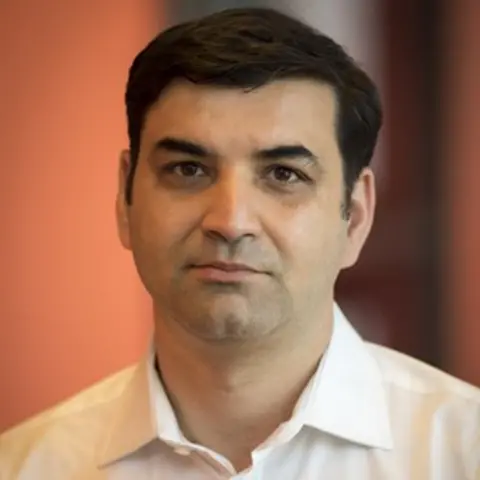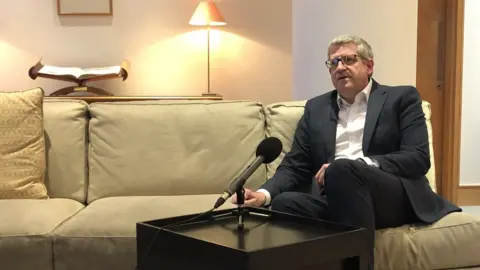How MI5 is adapting to fight coronavirus

 BBC
BBCAs he prepares to step down after seven years of leading MI5, Andrew Parker speaks to the BBC about coronavirus, counter-terrorism and how the Security Service has changed since he joined in 1983.
Inside MI5 headquarters at Thames House, Andrew Parker concedes it is a strange time to be leaving the organisation he has led for the last seven years.
Like other organisations, the Security Service has had to rapidly adapt to a new, unexpected world in the last few weeks since the coronavirus pandemic hit.
The priority has been to maintain its operations so that the emergency services can focus on Covid-19.
"At this time - maybe even more than normally - it is vital that the nation's national security machine is working so that the national emergency we are in now isn't further complicated or compounded by other events," Mr Parker says.
The corridors of Thames House may be quieter than normal but Mr Parker is careful not to provide too many details about how working patterns have changed.
"You'll understand if I don't go into exactly the ways in which we are working - what shape we are in. But MI5 is at work in a whole variety of ways flexibly operating to do our job."
A number of qualified medical staff including doctors and, nurses who usually work at MI5 have been released back to the NHS so they can serve on the front line.
MI5 has also been providing protective security to the design and construction of the new Nightingale hospitals.
Threats remain although with some changes.
"Some of the people we are most concerned about as potential sources of threat in this country are of course themselves under the lockdown arrangements and so their movements are restricted. That makes a difference to behaviour but does not eradicate the threat," Mr Parker says.
The death toll on individual days from coronavirus has often exceeded the total number of Britons killed by terrorism since 2001, and Parker acknowledges that this may change how politicians prioritise different risks.
"There is no doubt at all that having lived through the worst pandemic in a century the government is bound to think differently about how to configure against that risk and adjust the dials accordingly across public spending, I'm sure. But all of those decisions are yet to be taken."
'One of the worst moments of my life'
The July 2005 attacks were the pivotal moment for MI5 when four men from the UK detonated devices on the transport system. Mr Parker was then the director of counter-terrorism.
"I had one of the worst moments of my life realising that something like that was happening by seeing it on the rolling news on the TV on the wall in my office," he recalls. "For years afterwards, I had pinned on my notice board in my office the photos of all the victims."
The attacks led to significant changes in how the UK confronted terrorism which, he says, paid off when a plan which aimed to outdo 9/11 was stopped the following year.
A group of UK-based plotters who planned to bring down seven airliners over North American cities using liquid explosives were arrested. "It remains the biggest, most serious terrorist plot there has been in modern history," Parker says.
Parker became head of MI5 in 2013 and in 2017 a series of attacks rocked the UK. In two cases, London Bridge and Manchester, those responsible had been under investigation by MI5, leading to criticism from subsequent inquiries.
What went wrong? "I've been asked that a lot," Parker says.
"It's the right question. It's a reasonable challenge….we are every day having to position resources according to the fragments of knowledge we have….I don't deride these questions because we ask them of ourselves. After every attack, we do an internal review in order to learn these lessons."

- A SIMPLE GUIDE: How do I protect myself?
- AVOIDING CONTACT: The rules on self-isolation and exercise
- WHAT WE DON'T KNOW How to understand the death toll
- TESTING: Can I get tested for coronavirus?

MI5 has now taken the lead on far-right terrorism and remains active in Northern Ireland. But threats from other states have also become more prominent, with attempts to use disinformation and social media, notably by Russia, to sow discord.
"A thing we and the other [intelligence] agencies need to have as a modern-day priority is to defend our democratic systems from interference by foreign states," Mr Parker says. However, he said he had seen no evidence that Russian interference had an impact in the Brexit referendum.
China has moved into focus recently.
Much of the relationship may be economic but MI5 deals with the "sharper edges" of cyber espionage and intellectual property theft, according to Parker who says he was 'comfortable' with the advice of the intelligence agencies to allow Chinese company Huawei a limited role in the UK's 5G telecoms network.
Asked about reports that some in government believed there should be a "reckoning" with China over its failure to be sufficiently transparent about coronavirus, he said that was a political decision for the UK going forward.
As he prepares to leave an organisation he joined in 1983, Mr Parker says the biggest change he has seen is over who MI5 employs.
There were few people from black or other ethnic minority backgrounds when he began and, in particular, rules meant anyone who was gay would not have been allowed to work there. That policy was only changed in the early 1990s, a quarter of a century after homosexuality was decriminalised.
"It must have caused all sorts of hurt to people. And that has to be a matter of regret and shame for all us," Mr Parker says, the first time an MI5 head has acknowledged its past failings on this issue.
"It does feel a bit odd stepping away in a crisis rather than in a calmer time," Parker says of his departure, but adds that there will be no leaving party since MI5 is determined to keep to social distancing rules so that the NHS can do its job on the front-line.
